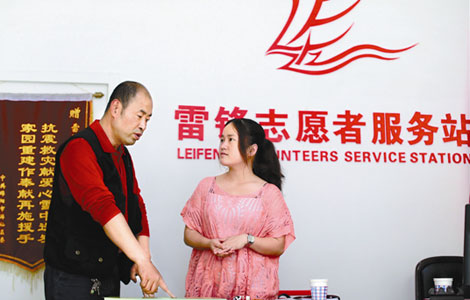Reform of administration
Updated: 2013-05-14 14:09
By Xin Zhiming (China Daily)
|
|||||||||||
Decentralization of approval power will enable government to concentrate resources on provision of social services
The State Council abolished or transferred to local government another 62 administrative approval items in early May, which was another step forward for administrative reform.
It made the decision at its executive meeting on May 6, after its decision on April 24 to abolish or devolve to local governments 71 administrative approval items.
In October, the central government removed 171 items of administrative examination and approval and transferred another 117 items to local governments.
The high frequency of such moves in recent months shows that the country's institutional reform, centered on the liberalization of approval power, is consistent and accelerating, which is important to spur economic growth, especially at a time of slack recovery.
China's GDP expanded by 7.7 percent year-on-year in the first quarter, down from 7.9 percent in the previous quarter, raising concerns that economic recovery could stall if the government fails to issue new measures to boost growth.
So far, however, the government has yet to launch any stimulus packages, instead, it has sent a clear signal that economic reform will be continued.
At its May 6 executive meeting, the State Council mapped out plans for pushing capital account convertibility and further development of the financial markets, encouraged investment abroad by individuals, and promoted fiscal reform by establishing a transparent and comprehensive budget system, among other things.
The orientation of reform is very clear and the meeting gave an unequivocal answer that reform is how the government will boost the economy.
Yet it is understandable that the market is anticipating a new stimulus, as the economy risks tumbling again after it registered 7.8 percent year-on-year growth in 2012, the lowest since 1999.
History shows that short-term boosts can effectively bail out the economy when it is battered by a crisis. During the 2008 global financial crisis, the Chinese government launched a 4-trillion-yuan ($645 billion) stimulus package, which successfully helped it bottom out from the crisis.
In the wake of the 1997-98 Asian Financial Crisis, China's proactive monetary and fiscal policies also worked in helping it resume stable growth.
However, after 30 years of fast growth driven by investment and exports and some rounds of stimulus measures, the Chinese economy now has less room for similar measures to be effective when the economy becomes slack.
A side effect of the stimulus package launched at the end of 2008 was the increased liquidity in the market, which is believed to have fueled rising prices, such as housing prices.
Although inflation remains low, 2.4 percent in April, far lower than the yearly target of 3.5 percent for this year, there is a lot of liquidity, which risks unexpectedly pushing up consumer inflation and exacerbating the already high house prices.
Therefore, policymakers should carefully weigh the pros and cons of any new stimulus measures.
Economic challenges aside, the convenience of a new stimulus package could prevent policymakers from seeking long-term and systematic solutions.
Admittedly, the government has played an important role in China's economic miracle over the past three decades. As the country's market economy develops, however, the philosophy of a small government and a bigger market should be adopted. The government should better play the role of a service provider and the market should be allowed to allocate resources.
In this sense, the recent moves by the central government to abolish or transfer to local governments administrative approval items are further progress not only in institutional reform but also in the country's overall market economy reform.
As the market economy develops, it will provide a more sustainable source of growth in the long run.
While it is an economic necessity, decentralizing approval power will also enable the government to concentrate its resources on the provision of social services, an increasingly daunting task for the government. For example, China's ongoing urbanization and the rapid ageing of society have required the government to provide more and better social services. By 2012, the proportion of people aged 60 or above to China's total population was about 14 percent and the proportion continues to rise. Meanwhile, the country's official urbanization rate was 51 percent in 2010 from slightly more than 30 percent in 1998.
These trends have forced the government to spend more on public services, such as healthcare.
The author is a senior writer with China Daily. E-mail: xinzhiming@chinadaily.com.cn
(China Daily 05/14/2013 page8)
Today's Top News
Chinese Premier on first foreign trip
China visit first step to Greece's investment return
PBOC faces balancing act with rate, inflation
China to simplify foreign exchange rules on FDI
Market to play bigger role in economic innovation
Economic issues to be priority of Li's 1-week trip
Work with Red Cross to get boost
Taiwan protests against Philippines over shooting
Hot Topics
Lunar probe , China growth forecasts, Emission rules get tougher, China seen through 'colored lens', International board,
Editor's Picks

|

|

|

|

|

|





